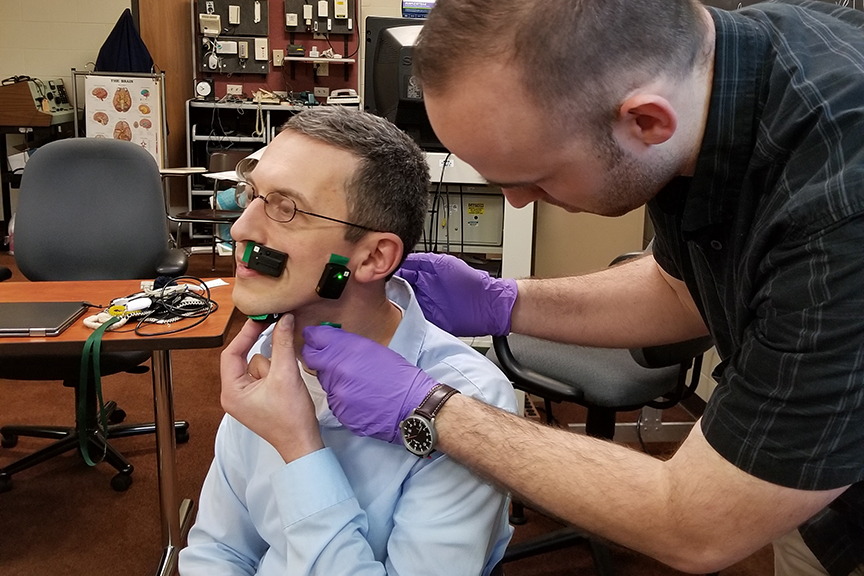Some say experience is the best teacher. For Russell Banks, experience may be the best motivator for his research.
Banks studies brain injury and the effect of concussions on voice and speech production through MSU’s College of Communication Arts and Sciences. He’s a Ph.D. student in the department of Communicative Sciences and Disorders where he also received his clinical master’s in speech pathology in 2015.
The effects of head injury on someone’s life wasn’t always something Banks thought about studying. His master’s research surrounded voice changes with aging, and his thesis examined how classroom size and extracurricular activities affect the vocal health of teachers. But deep down, Banks often felt pulled to pursue a different direction, propelled by a significant life experience.
In 2011—while studying speech pathology as an undergraduate—Banks was visiting family out East and experienced an auto accident. He was unconscious for 24 hours. Doctors told him he had a concussion.
“The care I received in the hospital was great,” said Banks. “But the aftercare and education I received afterward wasn’t.”
Caring for Concussions
Reflecting on that experience led Banks to draw on his background in speech pathology and redirect some of his research effort toward studying the effect of concussions. His overall goal, he said, is to further research and build awareness of how to help people who have had concussions and how to protect them against further injury.
Recently, Banks published a collaborative research paper summarizing current thought on the care, treatment, and activity and rest levels following concussions. His work “Concussions: Activity Avoidance and Rest Recommendation” appeared in the January issue of the journal Seminars in Speech & Language. Two months later, the paper served as the basis for a related presentation at the International Brain Injury Association World Congress in Toronto.
“In a way, my accident was a huge blessing,” Banks said. “I would never have gotten interested in the research I love, and met the people I have if I hadn’t experienced that.”
Evidence-Based Treatment
Following his auto accident, Banks began to notice the tremendous volume of research regarding concussion care and treatment within the last couple decades. Banks also observed an increasing popular interest in understanding concussions, primarily driven by concern related to sports-related head injuries in youth and adults.
Banks consulted with Ph.D. faculty advisers about the viability of doing a preliminary review of research that supports both rest and activity for the concussed population. He then tapped his network in the CSD community for a co-author, and began working with Anthony P. Salvatore, Distinguished Professor at the University of Louisiana-Lafayette, Department of Communicative Disorders.
His goal, he said, was to create a broad summary of evidence-based treatments for concussion and brain injury rehabilitation. Through a general survey of contemporary and scholarly thought, Banks and Salvatore succinctly presented the current state of rest recommendations, summarized the need for physical and cognitive rest for concussed individuals, and argued for further research on approaches to care and treatment.
“If we had a hypothesis, it would be that there is not a consensus about how much and what type of rest is recommended,” said Banks. “We simply wanted to update people on the state of where recommendations are generally at, and to compare and contrast research and literature.”
Determined to Make an Impact
Eric Hunter, CSD professor and associate dean of research at MSU’s College of Communication Arts and Sciences, serves as a technical adviser for Banks’ Ph.D. research. Hunter noted that Banks brings a unique passion and determination to each task, project or research he undertakes.
“Everything he sets out to do is carved from his sheer determination,” said Hunter. “I’m simply here as a cheerleader and to advise him on research and other academic approaches.”
Hunter added that Banks and his research illustrates the cross-collaborative work fostered at MSU—both within the college of ComArtSci, the university and beyond to other institutions.
“Like so many of our students, Russ is impacting our community—be it locally or around the world,” said Hunter. “He’s came to us with his interests and passion. We’re here to provide mentorship in a supportive, collaborative environment as he contributes to his field and the people we serve.”
By Ann Kammerer
